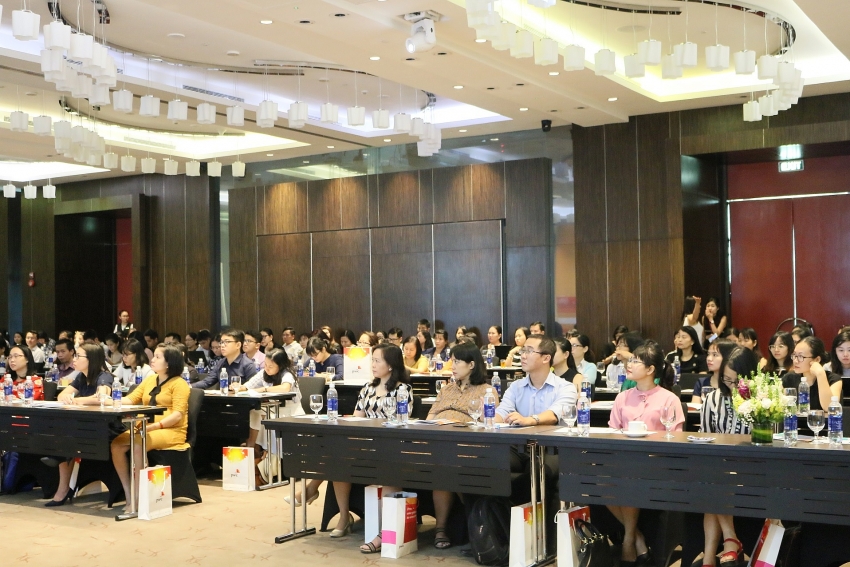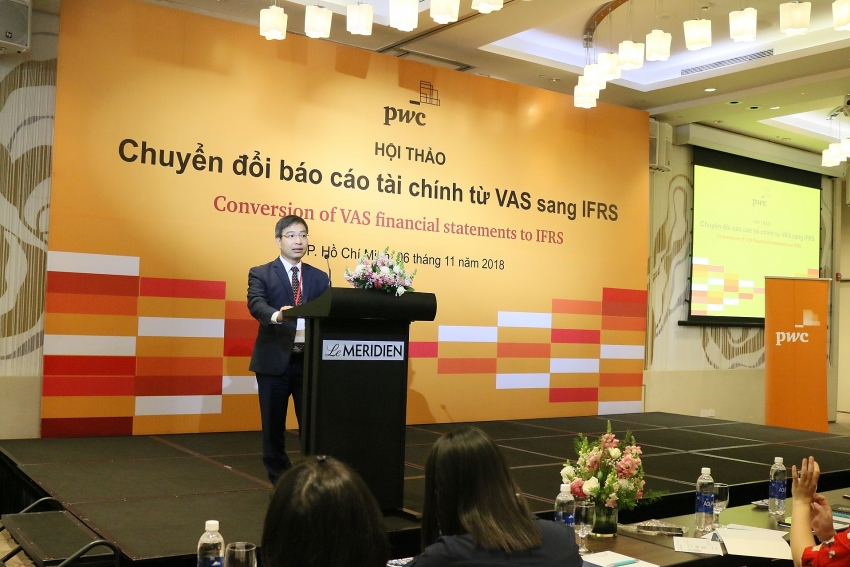Conversion of VAS financial statements to IFRS among Vietnamese firms
 |
| The PwC workshops attracted hundreds of business directors and financial-accounting experts |
The workshops, themed “Conversion of VAS financial statements to IFRS and new key points of IFRS in 2018/2019,” attracted more than 250 finance directors, heads of finance and accounting departments, chief accountants, and finance and accounting experts currently operating in Vietnam.
At the workshop, PwC’s experts and a speaker from the Ministry of Finance shared their knowledge and practical experiences on coping with the challenges of converting VAS to IFRS, as well as gave updates on new key points of IFRS in 2018/2019.
In fact, while IFRS is not yet mandatory in Vietnam, many companies have converted their financial statements from VAS into IFRS already.
The adoption of IFRS is expected to become more common in the Vietnamese business community, not only to align with the IFRS roadmap in Vietnam but also for Vietnamese companies to attract foreign investors who may expect international accounting standards.
| In fact, while IFRS is not yet mandatory in Vietnam, many companies have converted their financial statements from VAS into IFRS already. |
By actively preparing in advance for the Vietnam IFRS roadmap, Vietnamese companies could have sufficient time to analyse and prepare for relevant processes. Early preparation would enable companies to assess challenges properly, while at the same time better control costs, thus ensuring a smooth transition.
Conversion experience from Europe, Asia, and Australia shows that conversion projects often take more time and resources than anticipated. If not prepared, companies will be rushed when the conversion deadlines are close, leading to increased costs for compliance actions and inability to manage negative impacts.
At the same time, conversion brings a one-time opportunity to comprehensively reassess financial reporting and take “a clean sheet” approach to financial policies and processes.
Such an approach recognises that major accounting and reporting changes may have a ripple effect impacting many aspects of a company’s organisation.
Adopting IFRS will likely impact key performance metrics, requiring thoughtful communications roadmaps for the board of directors, shareholders, and other key stakeholders, especially impacts that could cause negative financial effects.
Internally, IFRS could have a broad impact on a company’s infrastructure, including underlying processes, systems, controls, even customer contracts and interactions.
The companies will face many challenges they cannot avoid when adopting IFRS so early adoption will help companies have more understanding about the changes and choose the most appropriate solution for the company.
Besides the benefits of conversion to IFRS financial statements, companies have encountered a number of difficulties and challenges in converting, largely due to the significant differences between VAS and IFRS and the requirement to have timely decisions from the board of management to control the impacts.
 |
| Tran Hong Kien, PwC Vietnam deputy general director |
“In the era of globalisation, by adopting IFRS, the Vietnamese economy and Vietnamese companies would gain from deeper integration into the region in terms of capital and investment co-operation opportunities,” said Tran Hong Kien, deputy general director of PwC Vietnam.
“More importantly, when Vietnamese companies are allowed to adopt IFRS, it would have the wider impact by improving corporate governance, financial data transparency, and the healthy development of the Vietnamese capital market.”
“With strong resources and experience in Vietnam and in the region, PwC Vietnam is actively co-operating with the Ministry of Finance and professional organisations on the Vietnam IFRS roadmap proposal, and at the same time, we are supporting companies in designing their own IFRS roadmap,” Kien added.
Luong Thi Anh Tuyet, director of Assurance and Accounting Services at PwC Vietnam, stressed the need to have a dedicated roadmap for IFRS from the beginning.
In her words, the first step is to train employees about IFRS. The second step is to practice and apply IFRS in operations, including analysing differences between VAS and IFRS and determining the adjustments needed for preparation of IFRS financial statements. The final step is to embed the IFRS financial information into the systems.
What the stars mean:
★ Poor ★ ★ Promising ★★★ Good ★★★★ Very good ★★★★★ Exceptional
Related Contents
Latest News
More News
- Vietnamese consumers express concern about climate change (October 11, 2025 | 14:06)
- ESG seen as key to Vietnam’s business credibility and capital attraction (September 29, 2025 | 18:38)
- From compliance to strategy: ESG criteria gaining ground (September 29, 2025 | 15:47)
- Vietnamese firms step up ESG game (September 23, 2025 | 15:26)
- Vietnam tax and legal changes set to shape foreign investment landscape (September 16, 2025 | 13:46)
- Vietnamese businesses navigate US tariffs (June 25, 2025 | 12:14)
- The impact of cloud, AI, and data on financial services (April 14, 2025 | 11:20)
- Vietnam 2025 M&A outlook: trends, deals, and opportunities (March 21, 2025 | 08:54)
- Vietnam's M&A landscape mirrors global trends (February 18, 2025 | 17:13)
- Asia-Pacific CEOs enter 2025 with optimism and caution (February 06, 2025 | 17:16)

 Tag:
Tag:























 Mobile Version
Mobile Version